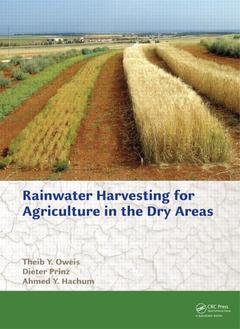Description
Rainwater Harvesting for Agriculture in the Dry Areas
Authors: Oweis Theib Y., Prinz Dieter, Hachum Ahmed Y.
Language: English
Subjects for Rainwater Harvesting for Agriculture in the Dry Areas:
Keywords
Water Harvesting; systems; Water Harvesting Systems; project; Water Harvesting Project; karlsruhe; Karlsruhe University; university; Water Harvesting Technique; techniques; Micro-catchment Water Harvesting; micro-catchment; Threshold Rain; photo; Rooftop Water Harvesting; courtesy; Floodwater Harvesting; crop; Exceedance Probability; color; Cropped Area; WH Structure; Unit Hydrograph; Low External Input Technology; Runoff Efficiency; Google Earth Images; Saturated Hydraulic Conductivity; Water Harvesting Scheme; Crop Water Requirements; Loess Slope; Percolation Dams; Rubber Tired Roller; Subsurface Dam; GIS Database; Effective Root Zone Depth
Approximative price 129.87 €
In Print (Delivery period: 14 days).
Add to cart366 p. · 17.4x24.6 cm · Hardback
Description
/li>Contents
/li>Readership
/li>Biography
/li>
Dry areas suffer not only from limited rainfall but also ?natural leakage??90% of rainwater is lost directly or indirectly, and is unavailable for agriculture or domestic use. Water harvesting is a low-cost, easy-to-use, environmentally-friendly way to recover a large part of this lost water.
How does water harvesting work? Which sites or areas are best suited and how can these areas be identified? How to design, build and maintain a water harvesting system tailored to local needs? How can water harvesting contribute to combating land degradation, enhancing food security and adapting to climate change? This book provides the answers.
The book is based on many years of research, training and development by three of the world?s leading experts in water management and agriculture. It is authoritative, comprehensive, and easy to read, containing practical examples, many illustrations and little jargon. This volume will be of great interest to researchers, development workers, farmers, policymakers, students of the natural sciences?in fact, anyone interested in efficient, sustainable management of water resources and agriculture.
1. Principles and practices of water harvesting 2. Hydrological aspects of water harvesting 3. Methods and techniques in water harvesting 4. Runoff inducement methods 5. Identification of areas suitable for water harvesting 6. Planning and design of water harvesting systems 7. Storage of harvested water 8. Implementation, operation, and maintenance of water harvesting systems 9. Socioeconomic issues 10. Water quality and environmental considerations
T. Oweis is the director of the Integrated Water and Land Management Program (IWLMP) at the International Center for Agricultural Research in the Dry Areas (ICARDA) (CGIAR Future Harvest Center). He has carried out research into and published extensively on irrigation and water management since the 1980s, fulfilling numerous academic and institutional roles over time.
D. Prinz is an independent consultant in matters concerning irrigation, water management and harvesting, and water & soil conservation. During the course of his career, he has published and lectured extensively on many aspects of rural engineering, with a particular focus on water and land resources development; irrigation, water and soil conservation and water harvesting in agriculture.
A. Hachum is Professor in the Department of Water Resources Engineering, College of Engineering, Mosul University, Iraq and consultant for the Integrated Water and Land Management Program, ICARDA. He has published many articles as well as a number of monographs on the topics of irrigation and water harvesting.




